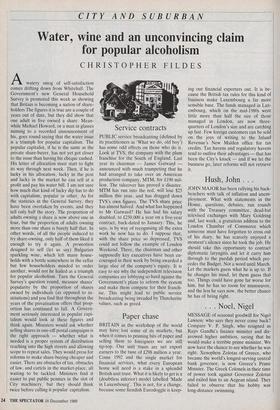CITY AND SUBURBAN
Water, wine and an unconvincing claim for popular alcoholism
CHRISTOPHER FILDES
Awatery smog of self-satisfaction comes drifting down from Whitehall. The Government's new General Household Survey is promoted this week as showing that Britain is becoming a nation of share- holders The figures it is true are a couple of years out of date, but they did show that one adult in five owned a share. Mean- while Michael Howard, or a man in glasses miming to a recorded announcement of his, goes round saying that the water issue is a triumph for popular capitalism. The popular capitalist, if he is the same as the private share-buyer, has not yet got closer to the issue than having his cheque cashed. His letter of allocation must start to fight its way through next week. Then, if he is lucky in his allocation, lucky in the post and lucky in the market he can sell at a profit and pay his water bill. I am not sure how much that kind of lucky dip has to do with capitalism, popular or other. As for the statistics in the General Survey, they have been overtaken by events, and they tell only half the story. The proportion of adults owning a share is now above one in four, but the proportion of adults owning more than one share is barely half that. In other words, of all the people induced to try share-owning, only half of them liked it enough to try it again. A promotion designed to sell (let us say) Bulgarian sparkling wine, which left many house- holds with a bottle somewhere in the cellar but few householders minded to order another, would not he hailed as a triumph for popular alcoholism. Turn the General Survey's question round, measure shares' popularity by the proportion of shares owned by individuals (as opposed to in- stitutions) and you find that throughout the years of the privatisation offers that prop- ortion has continued to fall. A Govern- ment seriously interested in popular capi- talism would look at these figures and think again. Ministers would ask whether selling shares in one-off postal campaigns is the right approach — whether what is needed is a proper system of distribution reaching into the high streets and allowing scope to repeat sales. They would press for reforms to make share-buying cheaper and easier. There are obstacles of tax, obstacles of law, and cartels in the market-place, all waiting to be tackled. Ministers find it easier to put public pennies in the slot of City machinery, but they should think twice before calling it popular capitalism.


















































 Previous page
Previous page